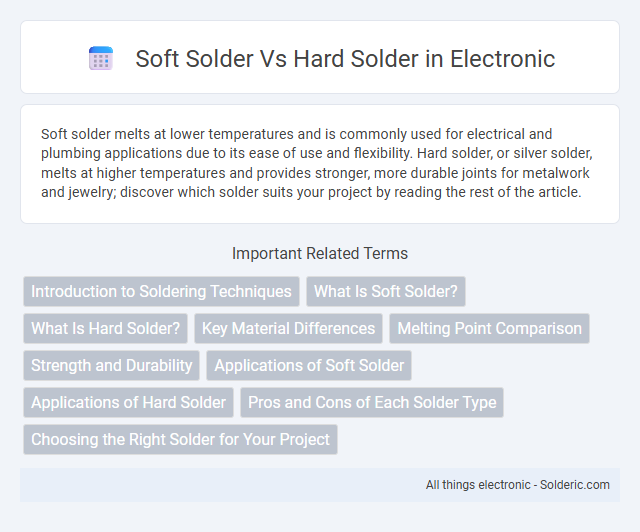Soft solder melts at lower temperatures and is commonly used for electrical and plumbing applications due to its ease of use and flexibility. Hard solder, or silver solder, melts at higher temperatures and provides stronger, more durable joints for metalwork and jewelry; discover which solder suits your project by reading the rest of the article.
Comparison Table
| Feature | Soft Solder | Hard Solder |
|---|---|---|
| Material Composition | Mostly tin-lead, tin-silver, or tin-copper alloys | Silver, copper, or brass-based alloys |
| Melting Temperature | Below 400degC (typically 180-250degC) | Above 400degC (often 600-900degC) |
| Strength | Lower mechanical strength | High mechanical strength and durability |
| Common Applications | Electronics, plumbing, and electrical connections | Jewelry, metalwork, HVAC, and instrument manufacturing |
| Base Metals Compatible | Copper, brass, aluminum | Steel, brass, copper, silver |
| Flux Required | Yes, often rosin based | Yes, typically acidic or neutral flux |
| Joint Appearance | Smooth, shiny finish | Strong, often visible seams |
| Repairability | Easy to reflow and repair | More difficult, requires reheating at high temps |
Introduction to Soldering Techniques
Soft soldering uses low melting point alloys, typically composed of tin and lead or lead-free alternatives like tin-silver-copper, ideal for delicate electronics and plumbing requiring less heat. Hard soldering, or brazing, employs higher melting point metals such as silver, copper, or brass alloys to join metals with stronger mechanical bonds suitable for structural applications. Understanding the temperature range and alloy composition is crucial for selecting the appropriate soldering technique to ensure optimal joint strength and thermal stability.
What Is Soft Solder?
Soft solder is a fusible metal alloy with a melting point below 450degC, commonly composed of tin-lead or tin-silver mixtures. It is primarily used for electrical connections and plumbing due to its lower melting temperature and ease of application. Soft solder provides a reliable bond without damaging sensitive components, making it ideal for delicate metal joining tasks.
What Is Hard Solder?
Hard solder, also known as silver solder or brazing filler metal, is a metal alloy used to join metal pieces at temperatures typically above 450degC (842degF). It creates strong, durable joints by melting and flowing into the joint gap, then solidifying to form a metallurgical bond. Hard solder is commonly applied in plumbing, jewelry making, and metal fabrication due to its high strength and corrosion resistance.
Key Material Differences
Soft solder primarily consists of tin and lead or tin and other metals, melting at lower temperatures between 180-250degC, making it suitable for delicate electronics and plumbing. Hard solder, or silver solder, contains higher percentages of silver, copper, and sometimes zinc, with melting points above 600degC, providing stronger, more durable joints ideal for metalwork and jewelry. Understanding these key material differences ensures your solder choice matches the thermal and mechanical demands of your project.
Melting Point Comparison
Soft solder typically melts at temperatures between 180degC and 250degC, making it suitable for delicate electronics and low-temperature applications. Hard solder, or brazing alloys, melts at much higher temperatures, generally above 450degC, providing stronger joints for metalworking and plumbing. Your choice between soft and hard solder should consider the required melting point to ensure optimal bonding and thermal compatibility with the materials involved.
Strength and Durability
Hard solder, also known as silver solder or brazing, offers superior strength and durability compared to soft solder due to its higher melting point and stronger metallurgical bond. Soft solder, typically made from tin-lead or lead-free alloys, provides adequate strength for electrical and HVAC applications but is less resistant to mechanical stress and thermal cycling. In applications requiring robust joints capable of withstanding heavy loads and high temperatures, hard solder is the preferred choice for enhanced longevity and reliability.
Applications of Soft Solder
Soft solder is primarily used in electrical and plumbing applications due to its low melting point and excellent electrical conductivity. It is ideal for joining delicate components in circuit boards, wire connections, and copper pipes where minimal heat exposure prevents damage. Its ability to create strong, leak-proof joints without requiring high temperatures makes it favorable for household and industrial plumbing systems.
Applications of Hard Solder
Hard solder, often used in applications requiring strong, permanent joints, is ideal for metalworking, jewelry making, and electronics assembly. It provides superior mechanical strength and heat resistance compared to soft solder, making it suitable for plumbing, HVAC systems, and aerospace components. The high melting point of hard solder alloys, such as silver or copper-based alloys, ensures durable connections in demanding environments.
Pros and Cons of Each Solder Type
Soft solder, typically made from a tin-lead or lead-free alloy, offers ease of use with a low melting point of around 180-190degC, making it ideal for electrical and plumbing applications; however, it has lower mechanical strength and temperature resistance compared to hard solder. Hard solder, which includes silver or brazing alloys with melting points above 450degC, provides superior joint strength and durability suitable for metalworking and high-stress environments, but it requires higher temperatures and more specialized equipment for application. Choosing between soft and hard solder depends on balancing factors such as mechanical strength, heat resistance, ease of application, and the specific requirements of the project.
Choosing the Right Solder for Your Project
Selecting between soft solder and hard solder depends on the required mechanical strength and temperature resistance of your project. Soft solder, typically based on tin-lead or lead-free alloys, is ideal for electrical connections and low-temperature applications due to its lower melting point around 180-250degC. Hard solder, often silver or brass-based with melting points above 600degC, provides stronger joints suitable for plumbing, jewelry, or heavy-duty metalwork where durability is essential.
Soft solder vs hard solder Infographic

 solderic.com
solderic.com